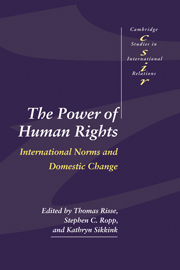Book contents
- Frontmatter
- Contents
- List of contributors
- Preface
- 1 The socialization of international human rights norms into domestic practices: introduction
- 2 Transnational activism and political change in Kenya and Uganda
- 3 The long and winding road: International norms and domestic political change in South Africa
- 4 Changing discourse: transnational advocacy networks in Tunisia and Morocco
- 5 Linking the unlinkable? International norms and nationalism in Indonesia and the Philippines
- 6 International norms and domestic politics in Chile and Guatemala
- 7 The Helsinki accords and political change in Eastern Europe
- 8 International human rights norms and domestic change: conclusions
- List of references
- Index
- Cambridge Cultural Social Studies
2 - Transnational activism and political change in Kenya and Uganda
Published online by Cambridge University Press: 07 December 2009
- Frontmatter
- Contents
- List of contributors
- Preface
- 1 The socialization of international human rights norms into domestic practices: introduction
- 2 Transnational activism and political change in Kenya and Uganda
- 3 The long and winding road: International norms and domestic political change in South Africa
- 4 Changing discourse: transnational advocacy networks in Tunisia and Morocco
- 5 Linking the unlinkable? International norms and nationalism in Indonesia and the Philippines
- 6 International norms and domestic politics in Chile and Guatemala
- 7 The Helsinki accords and political change in Eastern Europe
- 8 International human rights norms and domestic change: conclusions
- List of references
- Index
- Cambridge Cultural Social Studies
Summary
Introduction
Kenya and Uganda were both subject to intensive global human rights campaigns by international non-governmental organizations (INGOs). Alarming reports on the Ugandan human rights situation appeared in the early 1970s shortly after Idi Amin had staged a successful military coup. The human rights situation worsened throughout Amin's dictatorship and hardly improved after he was himself removed from power by violent means in 1979. Until early 1986 a civil war between government troops and various rebel groups led to continued gross violations of human rights. The situation slowly improved after the National Resistance Movement (NRM) as the main rebel organization took control of the main capital Kampala in January 1986.
Kenya came into the limelight of international attention in the mid- 1980s. In contrast to Uganda, increased human rights abuses were not a result of the militarization of politics and subsequent civil war. Moreover, the extent of human rights abuses was never comparable to the atrocities perpetrated in Uganda during the 1970s and early 1980s. Instead, human rights conditions deteriorated in Kenya because an increasingly powerful executive showed declining tolerance for political dissent and developed a personal and paternalistic style of rule. This development began under the independence president Jomo Kenyatta and continued until his death in 1978. During the 1980s, it was perfected by his successor Daniel arap Moi. After considerable transnational mobilization against the Kenyan government and subsequent domestic turbulence in 1991/1992, the executive was forced into a fragile political and constitutional reform process.
- Type
- Chapter
- Information
- The Power of Human RightsInternational Norms and Domestic Change, pp. 39 - 77Publisher: Cambridge University PressPrint publication year: 1999
- 13
- Cited by

